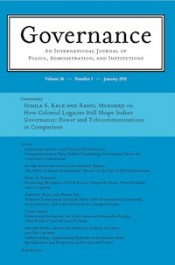Goldsmith on “What is governance?”
 Arthur Goldsmith of the University of Massachusetts Boston responds to Francis Fukuyama’s “What is governance?”:
Arthur Goldsmith of the University of Massachusetts Boston responds to Francis Fukuyama’s “What is governance?”:
“Good governance” arguably became the dominant paradigm for international development policy in the 1990s, as the shortcomings of the so-called Washington consensus suggested that institutional factors ought to be taken into account more fully in order for low- and medium-income countries to design and implement planned social and economic improvements. Right from the start, however, the good governance paradigm had difficulty dealing with the paradox that some seemingly poorly governed countries, notably China, appeared to be doing quite well on many dimensions of development. At the same time, most emerging nations floundered in trying to improve governance and make public agencies more effective in delivering basic services and promoting their private sectors.
It is thus with satisfaction that I read Francis Fukuyama’s commentary, which goes back to basics and asks what governance is and how we might measure it. Without greater conceptual clarity and agreement about definitions, as he points out, the good governance paradigm is bound to disappoint. Fukuyama comes up with a two dimensional matrix that emphasizes the tradeoffs between state capacity and bureaucratic autonomy. Many practitioners and students will find his way of framing governance lucid and thought-provoking.
The commentary is explicitly intended to generate discussion about the nature of good governance, not to suggest specific ways to quantify governance. Yet the clear implication is that it should be possible to put numbers on governance once the issues of taxonomy are settled. I am not so sure. The measurement problem is analogous to the one concerning democracy, which Fukuyama points out has received much more attention compared to governance. Some specialists have concluded the concept is too complex to be captured in a summary indicator, and therefore they focus on elections and other concrete political phenomena. I suspect that the most productive avenues for researching governance will lie with specific facets of public administration, for instance bureaucrats’ education levels, and not with abstractions such as “state capacity.”
Arthur Goldsmith is Professor and Associate Dean, College of Management, University of Massachusetts Boston.
Additional reading.
Goldsmith, Arthur A. (2011), No Country Left Behind? Performance Standards and Accountability in US Foreign Assistance. Development Policy Review, 29: s157–s176.
Sundaram, Jomo Kwame and Chowdhury, Anis, eds. (2012) Is Good Governance Good for Development? United Nations Publications. August 2012.
